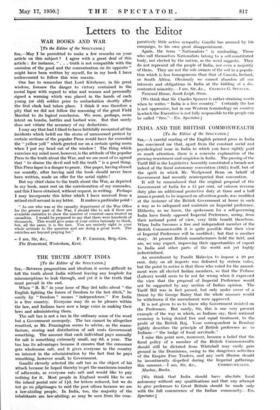Letters to the Editor
WAR BOOKS AND WAR 1[To the Editor of the SPECTATOR.] SIR,—M_ ay I be permitted to make a few remarks on your article on this subject ? I agree with a great deal of this
article : for instance, " . . . truth is not compatible with the omission of the good and the concentration on its opposite " might have been written by myself, for in my book I have endeavoured to follow this wise maxim.
One has to remember that Lord Kitchener, in his great wisdom, foresaw the danger to victory contained in the moral lapse with regard to wine and women and personally signed a warning which was placed in the hands of each young (or old) soldier prior to embarkation shortly after the first clash had taken place. I think it was therefore a pity that we did not follow the reasoning of the great Field Marshal to its logical conclusion. We were, perhaps, more intent on bombs, battles and barbed wire. But that surely does not vitiate the accuracy of my deductions.
I may say that had I liked to have faithfully recounted all the
incidents which befell me the storm of unreasoned protest by certain sections of the popular Press would have far exceeded the " yellow yell " which greeted me on a certain spring morn when I put my head out of the window ! The thing which exercises my mind most, however, is the attitude of the popular Press to the truth about the War, and we are most of us agreed that " to shame the devil and tell the truth " is a good thing.
This Press lapse is a danger to peace. One paper, having abused me soundly, after having said the book should never have been written, made an offer for the serial rights !
But my chief claim to the truth about the War, as depicted in my book, must rest on the corroboration of my comrades, and this I have obtained, without request, in writing. Perhaps I may incorporate this letter which I have received from a retired civil servant in my letter. It makes a particular point
" As one who was at the casualty department of the War Office for the greater part of the War, I should like to ask if there are available statistics to show the number of venereal cases treated as casualties. I would be prepared to say that there were hundreds of thousands. This would give some of your critics furiously to think, but, all the same, it is the fact. You are entirely right in your whole attitude to the question and are doing a great work. The ostriches are beyond praying for."
—I am, Sir, &c., F. P. CROZIER, Brig.-Gen.
The Homestead, Westerham, Kent.














































 Previous page
Previous page